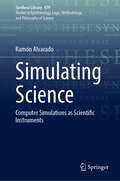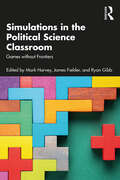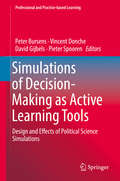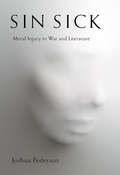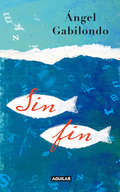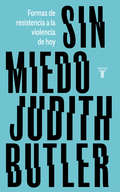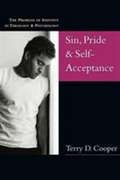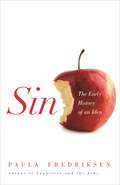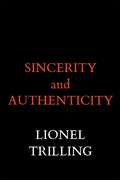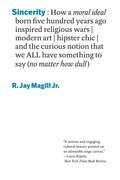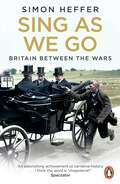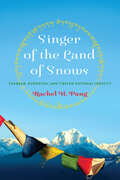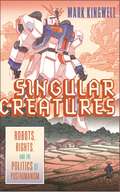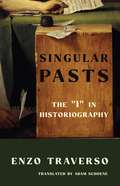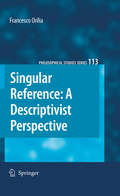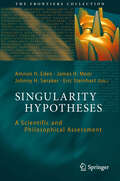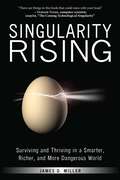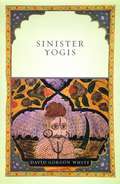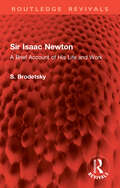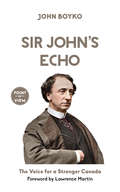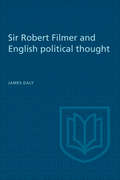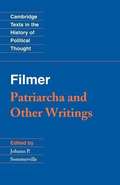- Table View
- List View
Simulating Science: Computer Simulations as Scientific Instruments (Synthese Library #479)
by Ramón AlvaradoThis book provides a philosophical framework to understand computer simulations as scientific instruments. This is in sharp contrast to existing philosophical approaches on the subject, which have historically understood computer simulations as either formal abstractions or as broadly construed empirical practices. In order to make its case, the volume contains a thorough examination of conventional philosophical approaches as well as their respective limitations. Yet, also, unlike other accounts of computer simulations from the perspective of the philosophy of science, this book incorporates insights from the philosophy of technology and the history of science. Hence, the book offers philosophers of science, technologists and other researchers interested in the topic, a thorough overview of the philosophical issues regarding the design, development and deployment of computer simulations in science and science-based policy making.
Simulations in the Political Science Classroom: Games without Frontiers
by Mark HarveyThis book is premised on the assumption that games and simulations provide welcome alternatives and supplements to traditional lectures and class discussions—especially in political science classrooms, where real-world circumstances provide ideal applications of theory and policy prescriptions. Implementing such an active learning program, however, is sometimes daunting to overburdened professors and teaching assistants. This book addresses the challenges of using games and simulations in the political science classroom, both online and in person. Each chapter offers a game or simulation that politics teachers can use to teach course concepts and explains ways to execute it effectively. In addition, the authors in this volume make a proactive case for games and simulations. Each chapter offers research to evaluate the effectiveness of the activity and pedagogical design best practices. Thus, the book not only serves as a game design resource, but also offers demonstrable support for using games and simulations in the political science classroom. Aimed at teachers at all levels, from high school through college, the book may be especially appealing to graduate students entering teaching for the first time and open to new teaching and learning approaches.
Simulations in the Political Science Classroom: Games without Frontiers
by Mark HarveyThis book is premised on the assumption that games and simulations provide welcome alternatives and supplements to traditional lectures and class discussions—especially in political science classrooms, where real-world circumstances provide ideal applications of theory and policy prescriptions. Implementing such an active learning program, however, is sometimes daunting to overburdened professors and teaching assistants. This book addresses the challenges of using games and simulations in the political science classroom, both online and in person. Each chapter offers a game or simulation that politics teachers can use to teach course concepts and explains ways to execute it effectively. In addition, the authors in this volume make a proactive case for games and simulations. Each chapter offers research to evaluate the effectiveness of the activity and pedagogical design best practices. Thus, the book not only serves as a game design resource, but also offers demonstrable support for using games and simulations in the political science classroom. Aimed at teachers at all levels, from high school through college, the book may be especially appealing to graduate students entering teaching for the first time and open to new teaching and learning approaches.
Simulations of Decision-Making as Active Learning Tools: Design And Effects Of Political Science Simulations (Professional and Practice-based Learning #22)
by Vincent Donche David Gijbels Peter Bursens Pieter SpoorenThis volume brings together both political and educational scientists. While educational research literature has so far not systematically addressed the tool of simulations of decision-making, political scientists have hardly used insights from research on assessment or on motivation and interest of students. Almost all political science publications on simulations merely discuss how to implement the tool in class and fall short of providing evidence of the effects on student outcomes such as increased interest and performance. Combining the two disciplines is mutually enriching. Political science benefits from state of the art educational science measuring and testing of the claims made by the proponents of simulations, while educational sciences adds the systematic analysis of simulations of decision-making to their list of empirical objects, which also adds insights to the theories on the affective component of student learning. It is the explicit aim of the volume to address how simulating decision-making environments fosters learning. Implications for research and practice regarding student learning are addressed in all chapters.
Sin Sick: Moral Injury in War and Literature
by Joshua PedersonIn Sin Sick, Joshua Pederson draws on the latest research about identifying and treating the pain of perpetration to advance and deploy a literary theory of moral injury that addresses fictional representations of the mental anguish of those who have injured or killed others. Pederson's work foregrounds moral injury, a recent psychological concept distinct from trauma that is used to describe the psychic wounds suffered by those who breach their own deeply held ethical principles.Complementing writings on trauma theory that posit the textual manifestation of trauma as absence, Sin Sick draws argues that moral injury appears in literature in a variety of forms of excess. Pederson closely reads works by Dostoevsky (Crime and Punishment), Camus (The Fall), and veterans of the wars in Iraq and Afghanistan (Brian Turner's Here, Bullet; Kevin Powers' The Yellow Birds; Phil Klay's Redeployment; and Roy Scranton's War Porn), contending that recognizing and understanding the suffering of perpetrators, without condoning their crimes, enriches the experience of reading—and of being human.
Sin fin
by Ángel GabilondoÁngel Gabilondo nos revela que hablar y escribir puede ser la creación constante de otras posibilidades, de otra realidad sin fin. «Los afectos son siempre una búsqueda»Ángel Gabilondo Este libro es una declaración, no una confesión. Aquí se expone una forma de vida que bien pudiera ser de cada uno de nosotros. No son fragmentos ni apuntes, son reflexiones completas de lo que podría decirse, que muestran una posición de afectos y de sentimientos, que a su vez son pensamiento, en una carta que no tiene final porque necesita de otro para ser escrita. Los afectos son siempre una búsqueda. Sin fin es la evidencia de que nos ocurre algo que a menudo nos desborda y que tiene que ver con lo que callamos -por pudor, por prudencia, por mantener nuestra intimidad-, con la pulsión que nos obliga a decir, a crear, a conocernos y a darnos cuenta de que hay ciertos asuntos que sOlo se conocen cuando se hablan. Avalado por la respuesta a sus anteriores obras, Alguien con quien hablar y Contigo, Ángel Gabilondo vuelve a promover en Sin fin la palabra honesta y certera, no solo para transmitirnos lo ya pensado, sino para sugerirnos lo que podemos llegar a pensar. Una obra que nos revela que hablar y escribir pueden ser además de una mera proyección de hechos, deseos o sentimientos la creación constante de otras posibilidades y, por encima de todo, de nosotros mismos.
Sin miedo: Formas de resistencia a la violencia de hoy
by Judith Butler«La violencia que vemos es una reacción frente a los progresos que hemos hecho, y eso significa que debemos seguir avanzando y aceptar que se trata de una lucha continuada, una lucha en la que los principios están de nuestro lado.» Judith Butler, una de las filósofas más reconocidas del mundo por sus contribuciones al feminismo, a la defensa de los derechos humanos y al pensamiento político, rastrea, en este nuevo libro, las formas de resistencia a las múltiples modalidades de violencia -desde la tortura por razones políticas, los crímenes contra mujeres, hasta la decisión de negar los horrores del pasado, el desprecio contra los migrantes o la desigualdad global- que caracteriza a nuestras sociedades contemporáneas. Sin miedo recoge una serie de conferencias recientes de la autora sobre justicia, memoria, duelo, crítica y disidencia, en las que formula, además de sus inestimables reflexiones filosóficas, un conjunto de herramientas conceptuales con las que repensar la resistencia ante cualquier forma de opresión. Judith Butler, autora de reconocidos ensayos de pensamiento político como Marcos de guerra, Dar cuenta de sí mismo y Vida precaria, vuelve en este nuevo libro a pensar y repensar en las formas de resistencia a las múltiples modalidades de violencia. A partir de sus más recientes conferencias, Contra la violencia es un conjunto de reflexiones sobre justicia, memoria, duelo y lamento, crítica y disenso que ofrece, además de sus inestimables reflexiones filosóficas, un conjunto de herramientas conceptuales con las cuales resignificar la resistencia a toda forma de subyugación.
Sin, Pride and Self-Acceptance: The Problem of Identity in Theology and Psychology
by Terry D. CooperWhat is at the root of the problem of humanity? Is it pride or lack of self-esteem?Do we love ourselves too much or too little?The debate about the human condition has often been framed this way in both theological and psychological circles. Convictions about preaching, teaching, marriage and child rearing, as well as politics, social welfare, business management and the helping professions, more often than not, fall on one side or the other of this divide. With theological and psychological insight Terry D. Cooper provides trenchant analysis of this centuries-long debate and leads us beyond the usual impasse. Humanistic psychology has often regarded traditional Christianity as its archrival in assessing the human condition. Cooper demonstrates how the Christian doctrine of a sinful and fallen humanity sheds light on the human condition which exhibits both pride and self-denigration. Bringing theological insights ranging from Augustine and John Calvin to Reinhold Niebuhr together with the psychological theories of Freud, Jung, Carl Rogers, Gerald May and Karen Horney, Cooper guides readers through the maze of competing claims to a resolution which affirms Christian conviction while critically engaging modern psychological theory. A model of the proper integration of Christian theology and the discipline of psychology,Sin, Pride & Self-Acceptance will be of special help to students and practitioners of psychology, pastoral counseling and clinical psychology.
Sin: The Early History of an Idea
by Paula FredriksenWhy the meaning of sin changed radically during the first centuries of ChristianityAncient Christians invoked sin to account for an astonishing range of things, from the death of God's son to the politics of the Roman Empire that worshipped him. In this book, award-winning historian of religion Paula Fredriksen tells the surprising story of early Christian concepts of sin, exploring the ways that sin came to shape ideas about God no less than about humanity.Long before Christianity, of course, cultures had articulated the idea that human wrongdoing violated relations with the divine. But Sin tells how, in the fevered atmosphere of the four centuries between Jesus and Augustine, singular new Christian ideas about sin emerged in rapid and vigorous variety, including the momentous shift from the belief that sin is something one does to something that one is born into. As the original defining circumstances of their movement quickly collapsed, early Christians were left to debate the causes, manifestations, and remedies of sin. This is a powerful and original account of the early history of an idea that has centrally shaped Christianity and left a deep impression on the secular world as well.
Sincerity and Authenticity
by Lionel Trilling"Now and then," writes Lionel Triling "it is possible to observe the moral life in process of revising itself. " In this new book he is concerned with such a mutation: the process by which the arduous enterprise of sincerity, of being true to one's self, came to occupy a place of supreme importance in the moral life--and the further shift which finds that place now usurped by the darker and still more strenuous modern ideal of authenticity. Instances range over the whole of Western literature and thought, from Shakespeare to Hegel to Sartre, from Robespierre to R. D. Laing, suggesting the contradictions and ironies to which the ideals of sincerity and authenticity give rise, most especially in contemporary life. Lucid, and brilliantly framed, its view of cultural history will give Sincerity and Authenticity an important place among the works of this distinguished critic.
Sincerity: How a moral ideal born five hundred years ago inspired religious wars, modern art, hipster chic, and the curious notion that we all have something to say (no matter how dull)
by R. Jay Magill Jr."A serious and engaging cultural history painted on an admirably large canvas."--Laura Kipnis, New York Times Book Review What do John Calvin, Sarah Palin, Jean-Jacques Rosseau, and Bon Iver have in common? A preoccupation with sincerity. With deep historical perspective and a brilliant contemporary spin, R. Jay Magill Jr. tells the beguiling tale of sincerity's theological past, its current emotional resonance, and the deep impact it has had on the Western soul. At a time when politicians are scrutinized less for the truth of what they say than for how much they really mean it, Sincerity provides a wide-ranging examination of a moral ideal that remains a strange magnetic north in our secular moral compass.
Sing As We Go: Britain Between the Wars
by Simon Heffer‘An epic new history . . . a work of epic scholarship, breathtaking range, and piercing originality’ Daily Express‘An astonishing achievement of narrative history . . . I think the word is "magisterial".’ Spectator‘Excellent, thorough, detailed and combatively argued.’ Sunday Times______________________________________Sing As We Go is an astonishingly ambitious overview of the political, social and cultural history of the country from 1919 to 1939.It explores and explains the politics of the period, and puts such moments of national turmoil as the General Strike of 1926 and the Abdication Crisis of 1936 under the microscope. It offers pen portraits of the era's most significant figures. It traces the changing face of Britain as cars made their first mass appearance, the suburbs sprawled, and radio and cinema became the means of mass entertainment. And it probes the deep divisions that split the nation: between the haves and have-nots, between warring ideological factions, and between those who promoted accommodation with fascism in Europe and those who bitterly opposed it.__________________________________________'Magisterial . . . an extraordinary achievement.’ Literary Review‘A masterful portrayal of political, social and cultural upheaval between the wars.’ Daily Mail
Singer of the Land of Snows: Shabkar, Buddhism, and Tibetan National Identity (Traditions and Transformations in Tibetan Buddhism)
by Rachel H. PangThe singular role of Shabkar in the development of the idea of Tibet Shabkar (1781–1851), the &“Singer of the Land of Snows,&” was a renowned yogi and poet who, through his autobiography and songs, developed a vision of Tibet as a Buddhist &“imagined community.&” By incorporating vernacular literature, providing a narrative mapping of the Tibetan plateau, reviving and adapting the legend of Tibetans as Avalokiteśvara&’s chosen people, and promoting shared Buddhist values and practices, Shabkar&’s concept of Tibet opened up the discursive space for the articulation of modern forms of Tibetan nationalism. Employing analytical lenses of cultural nationalism and literary studies, Rachel Pang explores the indigenous epistemologies of identity, community, and territory that predate contemporary state-centric definitions of nation and nationalism in Tibet and provides the definitive treatment of this foundational figure.
Singular Creatures: Robots, Rights, and the Politics of Posthumanism
by Mark KingwellAnxiety about non-human intelligent machines is a longstanding theme of cultural production and consumption. Examples range from tales of golems and Frankenstein’s monster to the evil overlord scenarios of contemporary film and television franchises: Star Trek, the Alien series, and the Terminator sequence, as well as Her, Black Mirror, Blade Runner, Ex Machina, and many other less mainstream cultural artifacts. The source of this anxiety is clear. Non-human conscious entities may turn out to be superior to any biological form of life, allowing a stride across human ambition in a moment dubbed “the Singularity” by AI insiders. This is the turning point when non-human entities advance and reproduce in a manner that surpasses and subjugates biological forms of intelligent life. Although today’s artificial intelligences fall notably short of this level of sophistication, Mark Kingwell argues that we are already more than human in important ways, and likely to become more so as time goes on. In Singular Creatures Kingwell plumbs the depths of cultural and political meaning in the apparent transition to posthuman life. Our immersion in technology, now comprehensive to the point of invisibility, has altered forever what it means to be alive. The politics of posthumanism flow directly from our own situation, at once dependent on technology and afraid of its effects on current and future experiences.More than a century after playwright Karel Čapek coined the word robot – rooted in the Czech robota, meaning “servitude” or “drudgery” – in his 1920 allegory about the alienation of forced labour leading to a violent workers’ revolt, Čapek’s central question continues to haunt us. Can humans and their own creations co-exist in a new cyberflesh world, or is a struggle for superiority inevitable? Singular Creatures is an attempt at sketching the field before any deadly battle is joined.
Singular Pasts: The "I" in Historiography
by Enzo TraversoToday, history is increasingly written in the first person. A growing number of historical works include an autobiographical dimension, as if writing about the past required exploring the inner life of the author. Neither traditional history nor autobiography, this hybrid genre calls the norms of the historical profession into question. In search of new and creative paths, it transgresses a cardinal rule of the discipline: third-person narration, long considered necessary to the objective analysis of the past.Singular Pasts offers a critical account of the emergence of authorial subjectivity in historical writing, scrutinizing both its achievements and its shortcomings. Enzo Traverso considers a group of contemporary historians, including Ivan Jablonka, Sergio Luzzatto, and Mark Mazower, who reveal their emotional ties to their subjects and give their writing a literary flavor. He identifies a parallel trend in literature, in which authors such as W. G. Sebald, Patrick Modiano, Javier Cercas, and Daniel Mendelsohn write their works as investigations based on archival sources. Traverso argues that first-person history mirrors contemporary ways of thinking: such writing is presentist and apolitical, perceiving and representing the past through an individual lens. Probing the limits of subjective historiography, he emphasizes that it is collective action that produces social change: “we” instead of “I.” In an epilogue, Traverso considers the first-person writing of Saidiya Hartman as a counterexample. A wide-ranging and illuminating critique of a key trend in humanistic inquiry, Singular Pasts reconsiders the notion of historical truth in a neoliberal age.
Singular Reference: A Descriptivist Perspective
by Francesco OriliaSingular reference is the relation that a singular term has to a corresponding individual. For example, "Obama" singularly refer to the current US president. Descriptivism holds that all singular terms refer by means of a concept associated to the term. The current trend is against this. This book explains in detail (mainly for newcomers) why anti-descriptivism became dominant in spite of its weaknesses and (for experts) how these weaknesses can be overcome by appropriately reviving descriptivism.
Singularity Hypotheses
by James H Moor Amnon H. Eden Johnny H Soraker Eric SteinhartSingularity Hypotheses: A Scientific and Philosophical Assessment offers authoritative, jargon-free essays and critical commentaries on accelerating technological progress and the notion of technological singularity. It focuses on conjectures about the intelligence explosion, transhumanism, and whole brain emulation. Recent years have seen a plethora of forecasts about the profound, disruptive impact that is likely to result from further progress in these areas. Many commentators however doubt the scientific rigor of these forecasts, rejecting them as speculative and unfounded. We therefore invited prominent computer scientists, physicists, philosophers, biologists, economists and other thinkers to assess the singularity hypotheses. Their contributions go beyond speculation, providing deep insights into the main issues and a balanced picture of the debate.
Singularity Rising: Surviving and Thriving in a Smarter, Richer, and More Dangerous World
by James D. MillerIn Ray Kurzweil's New York Times bestseller The Singularity is Near, the futurist and entrepreneur describes the Singularity, a likely future utterly different than anything we can imagine. The Singularity is triggered by the tremendous growth of human and computing intelligence that is an almost inevitable outcome of Moore's Law. Since the book's publication, the coming of the Singularity is now eagerly anticipated by many of the leading thinkers in Silicon Valley, from PayPal mastermind Peter Thiel to Google co-founder Larry Page. The formation of the Singularity University, and the huge popularity of the Singularity website kurzweilai.com, speak to the importance of this intellectual movement. But what about the average person? How will the Singularity affect our daily lives—our jobs, our families, and our wealth? Singularity Rising: Surviving and Thriving in a Smarter, Richer, and More Dangerous World focuses on the implications of a future society faced with an abundance of human and artificial intelligence. James D. Miller, an economics professor and popular speaker on the Singularity, reveals how natural selection has been increasing human intelligence over the past few thousand years and speculates on how intelligence enhancements will shape civilization over the next forty years. Miller considers several possible scenarios in this coming singularity: A merger of man and machine making society fantastically wealthy and nearly immortal Competition with billions of cheap AIs drive human wages to almost nothing while making investors rich Businesses rethink investment decisions to take into account an expected future period of intense creative destruction Inequality drops worldwide as technologies mitigate the cognitive cost of living in impoverished environments Drugs designed to fight Alzheimer's disease and keep soldiers alert on battlefields have the fortunate side effect of increasing all of their users' IQs, which, in turn, adds a percentage points to worldwide economic growth Singularity Rising offers predictions about the economic implications for a future of widely expanding intelligence and practical career and investment advice on flourishing on the way to the Singularity.
Singularity: Politics and Poetics
by Samuel WeberAn influential thinker on the concept of singularity and its implications on politics, theology, economics, psychoanalysis, and literature For readers versed in critical theory, German and comparative literature, or media studies, a new book by Samuel Weber is essential reading. Singularity is no exception. Bringing together two decades of his essays, it hones in on the surprising implications of the singular and its historical relation to the individual in politics, theology, economics, psychoanalysis, and literature. Although singularity has long been a keyword in literary studies and philosophy, never has it been explored as in this book, which distinguishes singularity as an &“aporetic&” notion from individuality, with which it remains historically closely tied.To speak or write of the singular is problematic, Weber argues, since once it is spoken of it is no longer strictly singular. Walter Benjamin observed that singularity and repetition imply each other. This approach informs the essays in Singularity. Weber notes that what distinguishes the singular from the individual is that it cannot be perceived directly, but rather experienced through feelings that depend on but also exceed cognition. This interdependence of cognition and affect plays itself out in politics, economics, and theology as well as in poetics. Political practice as well as its theory have been dominated by the attempt to domesticate singularity by subordinating it to the notion of individuality. Weber suggests that this political tendency draws support from what he calls &“the monotheological identity paradigm&” deriving from the idea of a unique and exclusive Creator-God. Despite the &“secular&” tendencies usually associated with Western modernity, this paradigm continues today to inform and influence political and economic practices, often displaying self-destructive tendencies. By contrast, Weber reads the literary writings of Hölderlin, Nietzsche, and Kafka as exemplary practices that put singularity into play, not as fiction but as friction, exposing the self-evidence of established conventions to be responses to challenges and problems that they often prefer to obscure or ignore.
Sinister Yogis
by David Gordon WhiteCombing through millennia of South Asia's vast and diverse literature, David discovers that yogis are usually portrayed as wonder-workers or sorcerers who use their dangerous supernatural abilities which can include raising the dead, possession, and levitation to acquire power, money, and sexual gratification.
Sinnliche Subjektivität bei Kant: Eine Studie vor dem Hintergrund der Phänomenologie Husserls
by Jiuxing MaoIn diesem Buch bringt Jiuxing Mao die kantische Philosophie und Husserls Phänomenologie hinsichtlich der Thematik der sinnlichen Subjektivität innerhalb der Erkenntnis- und Selbstbewusstseinstheorie miteinander in Dialog. Dieser Dialog ergibt sich als ein wechselseitiges Inspirieren und Zusammenstimmen. Er kann sowohl für die Untersuchung der kantischen Philosophie als auch für die der Husserlschen Phänomenologie gewinnbringend sein. Ziel dieser Arbeit ist es, die Transzendentalphilosophie Immanuel Kants in Hinsicht auf den Status der sinnlichen Subjektivität aus der Perspektive Husserls neu zu lesen und zu zeigen, dass und wie beide Denker wechselseitig aufeinander verwiesen sind. Der Autor Jiuxing Mao hat an der Freien Universität Berlin im Fachbereich Philosophie und Geisteswissenschaften promoviert.
Sir Isaac Newton: A Brief Account of His Life and Work (Routledge Revivals)
by S. BrodetskyOriginally published in 1927 this book presents the main features of Newton’s life and his chief contributions to scientific knowledge. It gives the non-scientist, as well as the specialist, an insight into the life, personality and achievements of one of England’s greatest scientists and polymaths.
Sir John's Echo: The Voice for a Stronger Canada
by John BoykoThe Hill Times: Best Books of 2017 As Sir John A. Macdonald intended, the federal government must be recognized as the nation’s voice. Power. It is the capacity to inspire while encouraging and enabling change, and it matters. When handled in a positive way, power is the key to the state’s ability to strengthen the nation and improve lives. But state power, John Boyko argues forcefully, works best when concentrated on a federal level, as Sir John A. Macdonald and Canada’s other founders intended. Provincial governments are essential, tending to local matters, administering and helping to fund national programs, and sometimes acting as incubators for ideas that grow to become national programs. But in fighting for scraps of power, premiers have often distracted from and occasionally hindered national progress. It is the federal government, as Boyko explains, that has been the primary force in nation building and emergency response, and is the only entity with the authority to speak for all Canadians. Canada has been at its best, and its strength will continue to grow, if we are true to Macdonald’s vision, with the federal government speaking for us in one voice, a voice that will remain Sir John’s echo.
Sir Robert Filmer and English Political Thought
by James DalySir Robert Filmer (1588-1653) was a defender of 'the Natural Power of Kings against the Unnatural Liberty of the People.' His doctrine of omnicompetent sovereignty had little influence on the thought and political debates of his time, for none of his writings was published until the last few years of his life; but it came under scrutiny later in the century, particularly during the exclusion crisis and in the political writings of John Locke. This book is the first comprehensive analysis of his thought, its context, and its place in English political thought as a whole. Daly examines Filmer's publishing career, his relation to contemporary writers and critics, and the chief sources on which he drew. The book thus provides the background for a study of Filmer's theory of sovereignty, its voluntarist concept of law, its rejection of prescription, fundamental law, and non-monarchical forms of government, and its insistence that monarchy be not only absolute, but arbitrary as well. Analysing Filmer's interpretation of Adam's (and all kings') 'fatherly power,' here described as 'legal patriarchalism,' Daly shows it to be very different from most contemporary thought. In comparing Filmer's thought with that of other royalists and the positions taken by his critics, notably Edward Gee, James Tyrrell, Algernon Sidney, and of course Locke, he shows it to be strikingly original, almost revolutionary, and frequently distorted by those who dealt with it.
Sir Robert Filmer: Patriarcha and Other Writings
by Robert Filmer Johann P. SommervilleThis volume contains the political writings of Sir Robert Filmer (1588-1653), an acute defender of absolute monarchy and perhaps the most important patriarchal political theorist of the seventeenth century. The recent explosion of interest in women's history and the history of the family has greatly enhanced the audience for Filmer's work, and in this new edition Johann Sommerville provides accurate and accessible texts of his principal writings, accompanied by all the standard series features, including a concise introduction, chronology, guide to further reading and notes on Filmer's own text.
